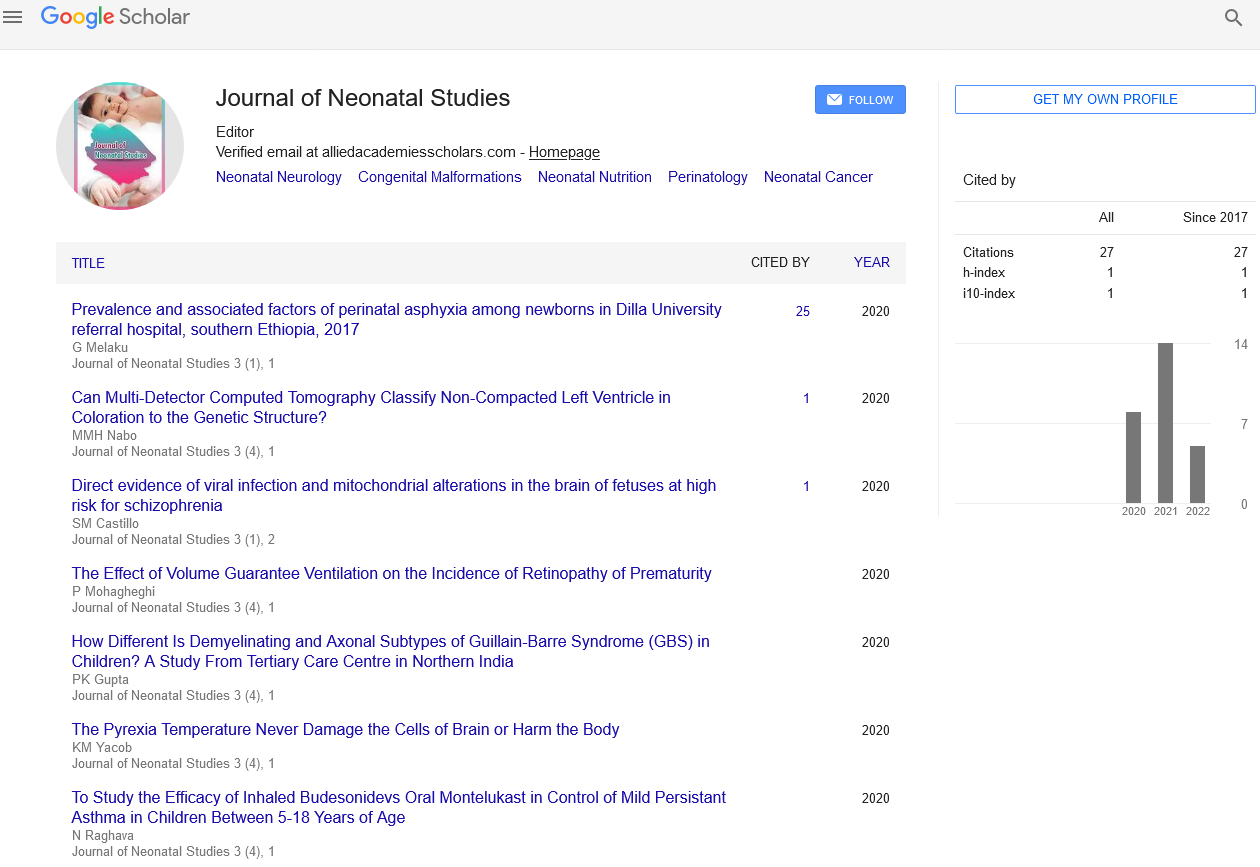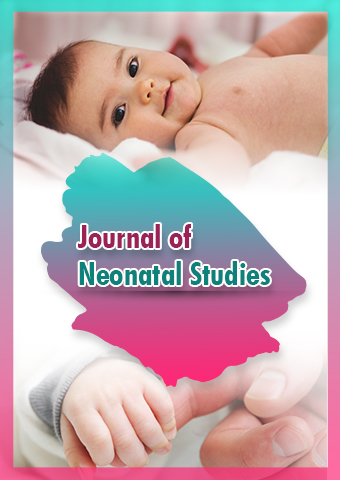Mini Review - Journal of Neonatal Studies (2023) Volume 6, Issue 2
The Neonatal Physicians and medical condition
Gitto Eloisa*
Neonatal Intensive Care Unit, Department of Pediatrics, University of Messina, Via Consolare Valeria, Messina, Italy
Neonatal Intensive Care Unit, Department of Pediatrics, University of Messina, Via Consolare Valeria, Messina, Italy
E-mail: eloissa.gitto@edu.it
Received: 01-Apr-2023, Manuscript No. jns-23-96805; Editor assigned: 03-Apr-2023, PreQC No. jns-22- 96805(PQ); Reviewed: 17-Apr-2023, QC No. jns-22-96805; Revised: 21- Apr-2023, Manuscript No. jns-22- 96805(R); Published: 28-Apr-2023; DOI: 10.37532/jns.2023.6(2).41-43
Abstract
Neonatal physicians, also known as neonatologists, are medical doctors who specialize in the care of new-born infants, particularly those who are premature or have medical complications. These highly trained professionals are experts in the diagnosis, treatment, and management of a wide range of medical conditions that affect newborns, and they work closely with a team of other healthcare professionals to provide comprehensive care to these fragile patients. The neonatal period is defined as the first 28 days of life, and during this time, babies are at their most vulnerable. Neonatologists are trained to care for infants who are born prematurely, with low birth weight, or who have medical conditions that require specialized care. They work in Neonatal Intensive Care Units (NICUs) and special care nurseries, providing aroundthe- clock care to ensure that these tiny patients receive the best possible start to life. Neonatal physicians, also known as neonatologists, are medical professionals who specialize in the care of new-born infants, particularly those who are born prematurely or have medical complications. These physicians work in Neonatal Intensive Care Units (NICUs) where they provide specialized care to premature babies, critically ill infants, and those with congenital abnormalities.
Keywords
Neonatal physician • Medical doctor • Diagnosis • Treatment • Neonatologists • New-born infant • Medical complication • Healthcare professional
Introduction
The role of a neonatologist begins even before a baby is born. They may be called upon to provide specialized care to a fetus that has been diagnosed with a medical condition that requires immediate attention. They work closely with obstetricians and other healthcare professionals to ensure that the baby receives the best possible care before, during, and after birth. Once a baby is born, a neonatologist will assess their health and determine if they require specialized care. They may need to be transferred to a NICU or special care nursery, where they will receive roundthe- clock monitoring and treatment. Neonatologists are skilled in the use of specialized medical equipment, such as ventilators and incubators, and they work closely with a team of nurses, respiratory therapists, and other healthcare professionals to provide the best possible care [1-3].
Neonatal physicians are trained to diagnose and treat a wide range of medical conditions that affect newborns, including respiratory distress syndrome, jaundice, sepsis, and congenital heart defects. They may also be called upon to provide specialized care to babies who are born addicted to drugs or alcohol, or who have experienced trauma during childbirth. One of the most important roles of a neonatologist is to provide emotional support to families during what can be a very difficult and stressful time. They understand that parents of premature or sick newborns may be feeling overwhelmed and anxious, and they work to provide reassurance and guidance throughout the entire process [4].
Discussion
Becoming a neonatologist requires extensive training and education. After completing medical school, a physician will complete a residency in pediatrics, followed by a fellowship in neonatalperinatal medicine. This specialized training includes coursework in the management of high-risk pregnancies, the care of premature infants, and the treatment of neonatal conditions. Neonatal physicians play a critical role in the care of newborns, particularly those who are premature or have medical complications. Their specialized training and expertise make them uniquely qualified to provide the best possible care to these fragile patients, and their commitment to providing emotional support to families is equally important. As the field of neonatology continues to evolve, these highly skilled professionals will continue to play a vital role in ensuring that every new-born receives the best possible start to life [5, 6].
Neonatal and medical condition
The field of neonatology has undergone significant advancements in recent decades, resulting in improved survival rates for premature babies and those with medical complications. Neonatal physicians play a crucial role in these advances, providing specialized care and treatment to newborns that require intensive medical attention. Neonatal physicians are trained to diagnose and manage a range of medical conditions that affect newborns, including respiratory distress syndrome, jaundice, hypoglycemia, and sepsis [7].
They also have expertise in the use of specialized equipment such as ventilators, incubators, and monitors, which are necessary for the care of premature and critically ill infants. In addition to medical management, neonatal physicians work closely with families to provide emotional support and education. They understand that having a sick or premature baby can be stressful and overwhelming for families, and they strive to provide compassionate care to both infants and their families. Neonatal physicians collaborate with other medical professionals, including nurses, respiratory therapists, and social workers, to provide comprehensive care to newborns [8].
They also work closely with obstetricians and perinatologists to coordinate the care of highrisk pregnancies and ensure that newborns receive appropriate care immediately after birth. The training required to become a neonatal physician is extensive and rigorous. After completing medical school, physicians must complete a residency in pediatrics, followed by a fellowship in neonatology. This training prepares physicians to manage the complex medical needs of newborns and provides them with the skills necessary to work in a high-pressure, fast-paced environment.
Conclusion
Neonatal physicians are an essential part of the medical community, providing critical care to the youngest and most vulnerable patients. These highly skilled professionals possess the knowledge and expertise required to diagnose and treat a wide range of medical conditions and illnesses that affect newborns. Neonatal physicians are responsible for the care of infants from the moment of birth until they are discharged from the hospital. They work closely with other healthcare professionals, including nurses, respiratory therapists, and pharmacists, to provide comprehensive care to newborns. Their role includes monitoring the health of the baby, diagnosing and treating any medical conditions, providing nutrition and hydration, administering medications, and supporting the family throughout the process. Neonatal physicians are also responsible for making critical decisions about a baby’s care, including when to use life-saving measures and when to withdraw treatment. The work of neonatal physicians is incredibly challenging and requires a high level of skill and dedication. They must be prepared to work long hours in high-stress environments, often facing life-or-death situations. They must also possess excellent communication skills to effectively communicate with families during what is often a very emotional and difficult time. Despite the challenges, the work of neonatal physicians is incredibly rewarding. They have the opportunity to make a significant difference in the lives of their patients and their families. They play a crucial role in improving the survival rates and outcomes of premature and sick newborns, which has a significant impact on public health [9, 10].
Acknowledgement
None
Conflict of Interest
None
References
- Sheard NF, Clark NG, Brand-Miller JC et al. Dietary carbohydrate (amount and type) in the prevention and management of diabetes: a statement by the American diabetes association. Diabetes Care. 27, 2266-2271 (2004).
- Chandalia M, Lutjohann D, von Bergmann K et al. Beneficial effects of high dietary fiber intake in patients with type 2 diabetes mellitus. N Engl J Med. 342, 1392-1398 (2000).
- Schwartz SE, Levine RA, Weinstock RS et al. Sustained pectin ingestion: effect on gastric emptying and glucose tolerance in non-insulin-dependent diabetic patients. Am J Clin Nutr. 48, 1413-1417 (1988).
- Reynolds A, Mann J, Cummings J et al. Carbohydrate quality and human health: a series of systematic reviews and meta-analyses. Lancet. 393, 434-445 (2019).
- Mannucci E, Giaccari A, Gallo M et al. Self-management in patients with type 2 diabetes: Group-based versus individual education a systematic review with meta-analysis of randomized trails. Nutr Metab Cardiovasc Dis. 32, 330-336 (2022).
- Emdin CA, Rahimi K, Callender T et al. Blood pressure lowering in type 2 diabetes: a systematic review and meta-analysis. JAMA. 313, 603-615 (2015).
- Webster MW. Clinical practice and implications of recent diabetes trials. Curr Opin Cardiol. 26, 288-293 (2011).
- Makam AN, Nguyen OK. An Evidence-Based Medicine Approach to Antihyperglycemic Therapy in Diabetes Mellitus to Overcome Overtreatment. Circulation. 135, 180-195 (2017).
- Davis N, Forbes B, Wylie-Rosett J et al. Nutritional strategies in type 2 diabetes mellitus. Mt Sinai J Med. 76, 257-268 (2009).
- Emdin CA, Rahimi K, Callender T et al. Blood pressure lowering in type 2 diabetes: a systematic review and meta-analysis. JAMA. 313, 603-615 (2015).
Indexed at, Google Scholar, Crossref
Indexed at, Google Scholar, Crossref
Indexed at, Google Scholar, Crossref
Indexed at, Google Scholar, Crossref
Indexed at, Google Scholar, Crossref
Indexed at, Google Scholar, Crossref
Indexed at, Google Scholar, Crossref
Indexed at, Google Scholar, Crossref
Indexed at, Google Scholar, Crossref

